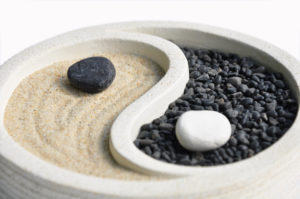
While humans have the capacity to extrapolate probable outcomes based on facts and trends, the future contains unknown variables. Our ancestors developed belief systems to explain how unseen forces impacted their existence and sought to improve their lives through either appeasing deities or interpreting weather patterns, animal and plant behavior, or specific characteristics in the soil. Feng shui, a Chinese metaphysical art, is a practice of placing buildings and the objects inside them to harness energies thought to exist in the world around us.
How Old Is Feng Shui?
Archaeologists have discovered evidence of feng shui practices inside homes and gravesites dating to between the fifth and fourth millennia B C.E. At first, ancient Chinese architects and builders relied on star charts and astrolabes to properly align homes, temples, public buildings, and other edifices. The advent of the magnetic compass around the second century B.C.E. helped simplify the process of placing buildings to harmonize with energies that they believed were present in the landscape.
Earth Energies and Local Spirits
The Ancient History Encyclopedia reveals that the art of feng shui is closely tied to Chinese beliefs in the Tudi Gong, or earth spirits who had dominion over specific locations. In many cases, they were thought to be deceased community members that still watched over the area as its guardians. Acknowledging and honoring their presence was considered vital to ensuring that the community prospered.
Feng shui translates as “wind and water,” which reflects some of the concepts behind it. Three key beliefs serve as part of its ideological foundations:
- Qi, pronounced as “chi” and referring to vital life energy that flows in the material world
- Yin and yang, the concept of complementary and yet contradictory forces that must exist in a careful balance with each other
- Wu Xing, or the five classical elements that comprise the universe
Ancient History Encyclopedia writer Mark Cartwright clarifies that yin and yang are thought to exist in pairs of opposites: feminine and masculine, dark and light, north and south, water and fire, and so on. This principle of opposites also guides how life shifts through five states: wood, fire, earth, metal, and water. In fact, “Wu Xing” more accurately translates as “moving” and may better describe a five-phase cycle than a group of elements. In contrast, the classical elemental view was mostly pioneered by the ancient Greeks.
Feng Shui and Energy Flow
Now classified as a form of geomancy, feng shui uses an energy flow cycle to determine how to orient rooms and buildings. In China, it was even used to properly place gravesites, construct royal palaces, and plan entire cities. Practitioners use either the eight compass points, the flow of wind and water over a landscape, or simplified principles derived from these two approaches. As Rodika Tchi illustrates in her article for The Spruce, modern Western feng shui depends heavily on the bagua, or energy map, for arranging rooms. Each segment of an eight-section bagua is labeled with a corresponding cardinal direction, type of energy, and the aspect of a person’s life that it impacts – for instance, south with water and career concerns, or east with wood and family relationships. Creative energies are said to begin with the wood phase and consecutively generate fire, earth, metal, and water, while destructive energies follow an opposite cycle beginning with water and ending with wood.
While feng shui is an ancient practice, it’s in danger of dying out in China. During the Cultural Revolution of the 1960s and 1970s, the country’s government labeled it superstition and declared it illegal. Few Chinese today engage in the art, but that number may be quietly growing. Even so, feng shui remains more popular in Western nations than in the country of its birth.

